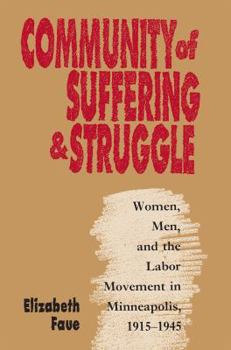Community of Suffering and Struggle: Women, Men, and the Labor Movement in Minneapolis, 1915-1945
Select Format
Select Condition 
Book Overview
Elizabeth Faue traces the transformation of the American labor movement from community forms of solidarity to bureaucratic unionism. Arguing that gender is central to understanding this shift, Faue explores women's involvement in labor and political organizations and the role of gender and family ideology in shaping unionism in the twentieth century. Her study of Minneapolis, the site of the important 1934 trucking strike, has broad implications for...
Format:Paperback
Language:English
ISBN:0807843075
ISBN13:9780807843079
Release Date:May 1991
Publisher:University of North Carolina Press
Length:324 Pages
Weight:1.22 lbs.
Dimensions:0.9" x 5.9" x 9.1"
Customer Reviews
0 rating





